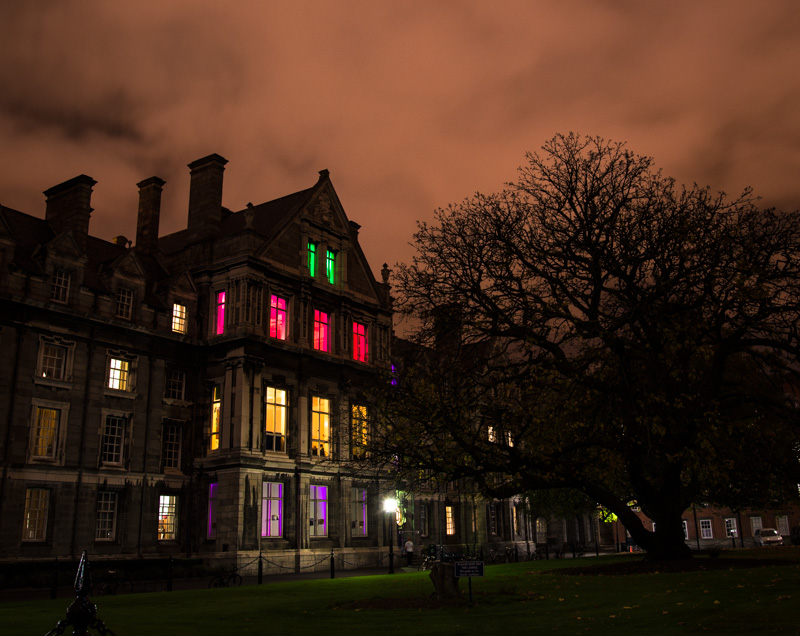
The Central Societies Committee (CSC) is one of the capitated bodies on campus, a group that also includes Dublin University Central Athletic Club (DUCAC), Trinity College Dublin Students’ Union (TCDSU), the Graduate Students’ Union (GSU) and Trinity Publications. The CSC is actually made up of all societies’ treasurers. The committee is an executive board who runs the daily affairs and is affiliated to all societies on campus. It also acts as a unifying voice for societies and provides support wherever it is needed, acting as an oversight board and oversees the society’s bank accounts.
Senior Sophister Law and Business student Benn Ó hÓgáin was elected Chairperson of the CSC at the end of last month following events that left the position vacant since last April. Speaking to The University Times, Ó hÓgáin describes how he “loves getting involved” in society life. Ó hÓgáin is the treasurer of An Cumman Gaelach this year and has been involved in Trinity Trad Society (Trad Soc), the Voluntary Tuition Programme (VTP) and the University of Dublin Choral Society (UDCS) in the past. Having spent the last year studying abroad in Brisbane, he was delighted to be given the opportunity to run for the position. The CSC was left without chairperson, treasurer and Ordinary Committee Member (OCM) for the last five months in the lead up to Freshers’ Week – one of the most important weeks on the CSC’s calendar. Ó hÓgáin praised the CSC for the “smooth running” of Freshers’ Week despite these difficulties.
Ó hÓgáin hopes to use his wealth of experience in this role that he sees as a “facilitator” of the executive. Aside from the procedural activities like chairing meetings and liaising with other capitated bodies, he also has to act as the “face of the CSC”. The role of chairperson doesn’t end there as he has to fill in the gaps where the job descriptions of the other executive roles of secretary, treasurer and amenities officer end.
Without a doubt, one of the biggest challenges facing societies at the moment is the issue of room allocation. Trinity’s societies have so much to offer and huge potential, and it is so disappointing to see that potential wasted over something so arbitrary as not enough space. Ó hÓgáin described space allocation as the “single biggest issue” facing the CSC. This issue has been exacerbated enormously by the demolition of Luce Hall to make space for the new business school as well as the unavailability of Regent House as it is being converted into a new visitor centre.
As with every new year, the start of this academic year has brought with it a host of new societies that have just set up or are working towards doing so. When asked about the myriad of hurdles students must face to set up a society, Ó hÓgáin contested the fact that it was too hard. He remains confident that the stringent procedures are in place because they are “dealing with students’ money” and that is an enormous responsibility. Students are supported the entire way through the process by the CSC. This rigorous process is in place to ensure fairness and that all societies are treated equally.
One of the biggest events, aside from Freshers’ Week, for the CSC is Fourth Week, which, as the name suggests, will be happening in week four of Michaelmas term. The purpose of this week is to “showcase the aims” of the various societies on campus. During Fourth Week, all events are free, and you don’t have to be a member of a society to take part. Ó hÓgáin and the CSC are genuinely excited about Fourth Week this year. It lets people who are less involved try something new as well as demonstrating the importance of societies on campus. Students can look forward to the return of the Trinity Arts Festival (TAF) takeover of the GMB. Previous years have seen the building transform into scenes from Dante’s Inferno while last year took inspiration from the Wonderful World of Oz. This is one of the most exciting and engaging events on campus with participation every year coming from some of Trinity’s best societies.
The most frequent complaint students have about societies is that they can be exclusive and students find them intimidating to take part in. One of the main aims of Fourth Week is undoubtedly to break down this barrier and create a greater sense of inclusivity as the free events are “open to all members of college”. Ó hÓgáin is hoping for “more involvement from all sides”, which will hopefully lead to one of the biggest, most visible and most inclusive Fourth Weeks yet.






